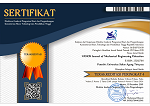The Project-Based Learning Development Module in the Learning of Heavy Equipment in Post-Pandemic in Improving Students' Cognitive and Psychomotor Skills
Abstract
Keywords
Full Text:
PDFReferences
D. Nopitasari and I. T. Udin, “Portfolio Based Insturuction The Perspective and Response in Teaching Writing for Secondary High School in Makassar (an Experimental Study ),” vol. 4, no. 1, pp. 118–125, 2022.
A. R. Sari, “Evaluasi Program Prioritas Pembangunan Bidang Pendidikan Provinsi Sumatera Utara,” vol. 9, no. 2, pp. 271–276, 2022, [Online]. Available: https://repositori.usu.ac.id/handle/123456789/48794
Nan-Chieh Chen, “An Education Approach to Problem Based Learning,” Kaohsiung J Med Sci, vol. 24, no. 3, pp. 23–30, 2008.
F. F. Kencana Sari, F. Kristin, and I. Anugraheni, “Keefektifan Model Pembelajaran Inquiry dan Discovery Learning Bermuatan Karakter terhadap Keterampilan Proses Ilmiah Siswa Kelas V dalam Pembelajaran Tematik,” JPDI (Jurnal Pendidik. Dasar Indones., vol. 4, no. 1, p. 1, 2019, doi: 10.26737/jpdi.v4i1.929.
M. Mossuto, “Problem-based learning: Student engagement, learning and contextualised problem-solving,” Managing, 2008, [Online]. Available: http://www.ncver.edu.au/publications/2198.html
Nurmalasari, “Pengaruh Model Pembelajaran Langsung (Direct Intruction) Terhadap Hasil Belajar siswa pada materi Gelombang di SMP Negeri 1 Teunom,” Banda Aceh, 2016.
A. Badia and L. Becerril, “Renaming teaching practice through teacher reflection using critical incidents on a virtual training course,” J. Educ. Teach., vol. 42, no. 2, pp. 224–238, 2016, doi: 10.1080/02607476.2016.1143146.
F. Ke, Z. Dai, M. Pachman, and X. Yuan, “Exploring multiuser virtual teaching simulation as an alternative learning environment for student instructors,” Instr. Sci., vol. 49, no. 6, pp. 831–854, 2021, doi: 10.1007/s11251-021-09555-4.
N. Putu Wardani, “Konsep Pembelajaran Student Centered Learning Di Perguruan Tinggi,” Konsep Pembelajaran Student Centered Learn. Di Perguru. Tinggi, pp. 1–10, 2016.
H. Maksum, W. Purwanto, and A. Baharudin, “Problem-based learning method with the teaching factory concept for improving student learning scores in the steering, brake, and suspension system course,” Int. J. Innov. Creat. Chang., vol. 8, no. 1, pp. 153–162, 2019.
Antoni Badiaa and Lucrecia Chumpitaz-Campos, “Teachers learn about student learning assessment through a teacher education process . Studies in DOI Document Version This is the Accepted Manuscript version . The version in t,” Stud. Educ. Eval., vol. 58, pp. 1–7, 2018.
M. Bower, B. Dalgarno, G. E. Kennedy, M. J. W. Lee, and J. Kenney, “Design and implementation factors in blended synchronous learning environments: Outcomes from a cross-case analysis,” Comput. Educ., vol. 86, pp. 1–17, 2015, doi: 10.1016/j.compedu.2015.03.006.
Dede, A. G. Abdullah, B. Mulyanti, D. Rohendi, and Sulaeman, “TVET learning innovation on automotive virtual laboratory based on cloud openstack,” J. Tech. Educ. Train., vol. 12, no. 3 Special Issue, pp. 51–60, 2020, doi: 10.30880/jtet.2020.12.03.005.
J. S. Vogler, P. Thompson, D. W. Davis, B. E. Mayfield, P. M. Finley, and D. Yasseri, “The hard work of soft skills: augmenting the project-based learning experience with interdisciplinary teamwork,” Instr. Sci., vol. 46, no. 3, pp. 457–488, 2018, doi: 10.1007/s11251-017-9438-9.
S. C. Scogin, C. J. Kruger, R. E. Jekkals, and C. Steinfeldt, “Learning by experience in a standardized testing culture: Investigation of a middle school experiential learning program,” J. Exp. Educ., vol. 40, no. 1, pp. 39–57, 2017, doi: 10.1177/1053825916685737.
P. Guo, N. Saab, L. S. Post, and W. Admiraal, “A review of project-based learning in higher education: Student outcomes and measures,” Int. J. Educ. Res., vol. 102, no. May, p. 101586, 2020, doi: 10.1016/j.ijer.2020.101586.
C. H. Chen and Y. C. Yang, Revisiting the effects of project-based learning on students’ academic achievement: A meta-analysis investigating moderators, vol. 26. Elsevier Ltd, 2019. doi: 10.1016/j.edurev.2018.11.001.
A. Torres, J. Hu, V. Sriraman, A. Martínez-Ortiz, and J. Membrillo-Hernández, “Assessing the Effectiveness of Problem-Based Learning Across Two Concrete Construction Courses,” Int. J. Instr., vol. 15, no. 4, pp. 473–496, 2022, doi: 10.29333/iji.2022.15426a.
M. L. Grunis, I. I. Golovanova, G. I. Kirilova, E. Y. Levina, and Z. M. Sizova, “Transformation of pedagogical communicative competence during creation digital online courses,” Contemp. Educ. Technol., vol. 13, no. 1, pp. 1–13, 2021, doi: 10.30935/cedtech/9313.
E. Malkawi, A. K. Bawaneh, and M. S. Bawa’aneh, “Campus off, education on: Uaeu students’ satisfaction and attitudes towards e-learning and virtual classes during covid-19 pandemic,” Contemp. Educ. Technol., vol. 13, no. 1, pp. 1–14, 2021, doi: 10.30935/cedtech/8708.
H. Maksum and W. Purwanto, “The Development of Electronic Teaching Module for Implementation of Project-Based Learning during the Pandemic,” Int. J. Educ. Math. Sci. Technol., vol. 10, no. 2, pp. 293–307, 2022, doi: 10.46328/ijemst.2247.
C. E. Huang, “Discovering the creative processes of students: Multi-way interactions among knowledge acquisition, sharing and learning environment,” J. Hosp. Leis. Sport Tour. Educ., vol. 26, no. December 2019, p. 100237, 2020, doi: 10.1016/j.jhlste.2019.100237.
G. Marschall, “The role of teacher identity in teacher self-efficacy development: the case of Katie,” J. Math. Teach. Educ., vol. 25, no. 6, pp. 725–747, 2022, doi: 10.1007/s10857-021-09515-2.
UNP, “Buku Pedoman Akademik Fakultas Teknik Universitas Negeri Padang 2018/2019,” 2018.
M. A. Zakky, A. Kamil, I. A. Wafa, and M. A. Basori, Indonesian Cognitive Test for Educational Psychology. Atlantis Press SARL, 2023. doi: 10.2991/978-2-38476-032-9.
Hardani et al., Metode Penelitian Kualitatif & Kuantitatif, 1st ed., no. March. Yogyakarta: Penerbit Pustaka Ilmu, 2020.
Sugiyono, “Statistika untuk Penelitian,” vol. 12. pp. 1–415, 2018.
A. Kurniawan, “Metodologi Pendidikan.” PT. Remaja Rosdakarya, Bandung, p. 108, 2018.
I. Hasanah, S. Sarwanto, and M. Masykuri, “Pengembangan Modul Suhu dan Kalor Berbasis Project Based Learning untuk Meningkatkan Keterampilan Proses Sains dan Kemampuan Berpikir Kritis Siswa SMA/MA,” J. Pendidik. (Teori dan Prakt., vol. 3, no. 1, p. 38, 2018, doi: 10.26740/jp.v3n1.p38-44.
DOI: http://dx.doi.org/10.30870/vanos.v8i1.17802
Refbacks
- There are currently no refbacks.

This work is licensed under a Creative Commons Attribution 4.0 International License.


.png)
.png)
